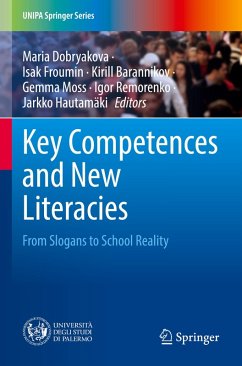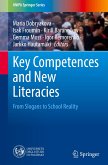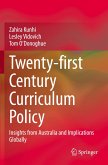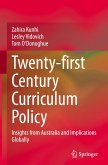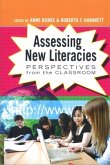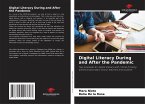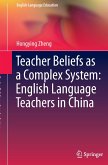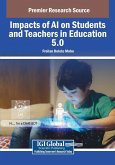Key Competences and New Literacies
From Slogans to School Reality
Herausgegeben:Dobryakova, Maria; Froumin, Isak; Barannikov, Kirill; Moss, Gemma; Remorenko, Igor; Hautamäki, Jarkko
Key Competences and New Literacies
From Slogans to School Reality
Herausgegeben:Dobryakova, Maria; Froumin, Isak; Barannikov, Kirill; Moss, Gemma; Remorenko, Igor; Hautamäki, Jarkko
- Broschiertes Buch
- Merkliste
- Auf die Merkliste
- Bewerten Bewerten
- Teilen
- Produkt teilen
- Produkterinnerung
- Produkterinnerung
This edited book is a unique comprehensive discussion of 21st century skills in education in a comparative perspective. It presents investigation on how eight very different countries (China, Canada, England, Finland, Poland, South Korea, the USA and Russia) have attempted to integrate key competences and new literacies into their curricula and balance them with the acquisition of disciplinary knowledge. Bringing together psychological, sociological, pedagogical approaches, the book also explores theoretical underpinnings of 21st century skills and offers a scalable solution to align multiple…mehr
Andere Kunden interessierten sich auch für
![Key Competences and New Literacies Key Competences and New Literacies]() Key Competences and New Literacies112,99 €
Key Competences and New Literacies112,99 €![Twenty-first Century Curriculum Policy Twenty-first Century Curriculum Policy]() Zahira KunhiTwenty-first Century Curriculum Policy128,39 €
Zahira KunhiTwenty-first Century Curriculum Policy128,39 €![Twenty-first Century Curriculum Policy Twenty-first Century Curriculum Policy]() Zahira KunhiTwenty-first Century Curriculum Policy90,99 €
Zahira KunhiTwenty-first Century Curriculum Policy90,99 €![Assessing New Literacies Assessing New Literacies]() Assessing New Literacies40,50 €
Assessing New Literacies40,50 €![Digital Literacy During and After the Pandemic Digital Literacy During and After the Pandemic]() Mara NietoDigital Literacy During and After the Pandemic40,99 €
Mara NietoDigital Literacy During and After the Pandemic40,99 €![Teacher Beliefs as a Complex System: English Language Teachers in China Teacher Beliefs as a Complex System: English Language Teachers in China]() Hongying ZhengTeacher Beliefs as a Complex System: English Language Teachers in China38,99 €
Hongying ZhengTeacher Beliefs as a Complex System: English Language Teachers in China38,99 €![Impacts of AI on Students and Teachers in Education 5.0 Impacts of AI on Students and Teachers in Education 5.0]() Impacts of AI on Students and Teachers in Education 5.0206,99 €
Impacts of AI on Students and Teachers in Education 5.0206,99 €-
-
-
This edited book is a unique comprehensive discussion of 21st century skills in education in a comparative perspective. It presents investigation on how eight very different countries (China, Canada, England, Finland, Poland, South Korea, the USA and Russia) have attempted to integrate key competences and new literacies into their curricula and balance them with the acquisition of disciplinary knowledge. Bringing together psychological, sociological, pedagogical approaches, the book also explores theoretical underpinnings of 21st century skills and offers a scalable solution to align multiple competency and literacy frameworks.
The book provides a conceptual framework for curriculum reform and transformation of school practice designed to ensure that every school graduate thrives in our technologically and culturally changing world. By providing eight empirical portraits of competence-driven curriculum reform, this book is greatresource to educational researchers and policy makers.
The book provides a conceptual framework for curriculum reform and transformation of school practice designed to ensure that every school graduate thrives in our technologically and culturally changing world. By providing eight empirical portraits of competence-driven curriculum reform, this book is greatresource to educational researchers and policy makers.
Produktdetails
- Produktdetails
- UNIPA Springer Series
- Verlag: Springer / Springer International Publishing / Springer, Berlin
- Artikelnr. des Verlages: 978-3-031-23283-1
- 2023
- Seitenzahl: 432
- Erscheinungstermin: 23. August 2024
- Englisch
- Abmessung: 235mm x 155mm x 24mm
- Gewicht: 651g
- ISBN-13: 9783031232831
- ISBN-10: 3031232836
- Artikelnr.: 71495654
- Herstellerkennzeichnung
- Springer-Verlag GmbH
- Tiergartenstr. 17
- 69121 Heidelberg
- ProductSafety@springernature.com
- UNIPA Springer Series
- Verlag: Springer / Springer International Publishing / Springer, Berlin
- Artikelnr. des Verlages: 978-3-031-23283-1
- 2023
- Seitenzahl: 432
- Erscheinungstermin: 23. August 2024
- Englisch
- Abmessung: 235mm x 155mm x 24mm
- Gewicht: 651g
- ISBN-13: 9783031232831
- ISBN-10: 3031232836
- Artikelnr.: 71495654
- Herstellerkennzeichnung
- Springer-Verlag GmbH
- Tiergartenstr. 17
- 69121 Heidelberg
- ProductSafety@springernature.com
Maria Dobryakova graduated from the Moscow School of Social and Economic Sciences and Manchester University (M.A. in Sociology) and defended her Ph.D. in social stratification at the Institute of Sociology of the Russian Academy of Sciences. Since 2006 and until 2022 she worked at the National Research University Higher School of Economics, where she headed and coordinated a number of large-scale projects in education, social sciences, as well as publications and translation projects. Prior to that, she had worked at the Independent Institute for Social Policy (as head of publications) and the Ford Foundation (Higher Education and Scholarship program). Isak Froumin headed the Institute of education at the National Research University Higher School of Economics in Moscow (Russia)-the first graduate school of education in Russia-from 2009 to 2021. After beginning his career as a principal of Kransnoyarsk University Laboratory School (Russia), he worked as the Lead Education Specialist at the World Bank, and the advisor to the Minister of Education and Science of Russian Federation. He is a fellow of the International Academy of Education. Kirill A. Barannikov is the vice-rector for strategy, Moscow City University. He is working in MCU since 2015 and has led a number of projects over Moscow schools and the university development. Among the most striking projects are the online platform for teachers to create curricula (www.prok.edu.ru), the electronic platform for assessing the quality of the educational environment (www.ecers.ru, www.sacers.ru), internet service for supporting and developing initiatives (www.zamisli.pro). Over the past ten years, he headed the center for distance education of children with disabilities of the Pedagogical Academy of Postgraduate Education, the center of curricula design and standards of the Academy of Social Management. He coordinated over 40 research projects of the Department of Education of the City of Moscow, the Ministry of Education and Science of Russia. The main areas of interest are competency models in school education, issues of standardization and curricula design in an international context, change management in schools and universities. Jarkko Hautamäki graduated from University of Helsinki (majors in experimental psychology and social psychology) and defended his Ph.D. Dissertation (Measurement and Distribution of Piagetian Stages of Thinking) in University Joensuu. He became a full professor in Special Education in Helsinki University, served also the dean and founded and directed Helsinki University Center for Educational Assessment. He is the honorary professor of Faculty of Psychology at Moscow State University, member of the Finnish Academy of Science and Letters and member of The Russian Academy of Educational Sciences. His research interests include human development and schooling for thinking, interventions and special education and applying the science of development into schooling. He lives in Helsinki, Finland. Gemma Moss is the professor of Literacy at UCL Institute of Education. She has been the president of the British Educational Research Association (2015-17), was a member of the European Education Research Association Council (2016-18), was director of the Centre for Critical Education Studies at the Institute of Education (2007-11) and was director of the International Literacy Centre at the Institute of Education, UCL (2017-22). Her main research interests are in literacy as a social practice; literacy policy; knowledge transfer and knowledge exchange; evidence-informed practice and curriculum design; pedagogy and new technologies; primary assessment; and gender and literacy attainment. Her research includes running multi-site ethnographic case studies, combining quantitative and qualitative methods in innovative ways and using rapid evidence assessment systematic review processes to bring knowledge to bear on contentious questions in education, where funders require rapid answers. Igor M. Remorenko has been holding the post of the rector of the Moscow City University since 2013. He has a Ph.D. and full-doctor degree in Education. From 2009 to 2011, he held the post of the director of the Department of the State Policy and Legal Regulations in Education, Department of the State Policy in Education, Department of the Strategic Development of the Ministry of Education and Science of the Russian Federation; supervised the top-priority national project "Education" and programs to support the innovative development of the higher education institutes. From 2011 to 2013, he is the deputy minister of Education and Science of the Russian Federation. He is the author of a number of the scientific publications, two monographs. He participates in the researches in the field of educational policy, development of managerial approaches in education and multiple international and national projects in the sphere of education.
Introduction: A global debate on new learning objectives.- Chapter 1 The world is changing, and education is changing with it.- Chapter 2 A framework of key competences and new literacies.- Chapter 3 Canada (Ontario): A Unifying Theme for Canadian Education Is Equity.- Chapter 4 China: Cultivating a Fully Developed Person-'Moral, Intellectual, and Physically Healthy'.- Chapter 5 England: Knowledge, Competences and Curriculum Reform: Why the English Case Stands Out.- Chapter 6 Republic of Korea: Cultivating Key Competences.- Chapter 7 Finland: Improving Pupils' Opportunities for Experiencing the Joy of Learning, for Deep Learning, and for Good Learning Achievement.- Chapter 8 Poland: The Learning Environment That Brought about a Change.- Chapter 9 Twenty-First Century Skills and Learning: A Case Study of Developments and Practices in the United States.- Chapter 10 Russian Federation: at a conceptual crossroads.- Chapter 11 Pedagogical and school practices to foster key competencesand domain-general literacy.- Chapter 12 A modern aspect of domain-general instrumental literacy: coding.- Chapter 13 How to Integrate New Literacy in the Curriculum - Example of Environmental Literacy.- Chapter 14 Conclusion: How countries reform their curricula to support the development of key competences.
Introduction: A global debate on new learning objectives.- Chapter 1 The world is changing, and education is changing with it.- Chapter 2 A framework of key competences and new literacies.- Chapter 3 Canada (Ontario): A Unifying Theme for Canadian Education Is Equity.- Chapter 4 China: Cultivating a Fully Developed Person-'Moral, Intellectual, and Physically Healthy'.- Chapter 5 England: Knowledge, Competences and Curriculum Reform: Why the English Case Stands Out.- Chapter 6 Republic of Korea: Cultivating Key Competences.- Chapter 7 Finland: Improving Pupils' Opportunities for Experiencing the Joy of Learning, for Deep Learning, and for Good Learning Achievement.- Chapter 8 Poland: The Learning Environment That Brought about a Change.- Chapter 9 Twenty-First Century Skills and Learning: A Case Study of Developments and Practices in the United States.- Chapter 10 Russian Federation: at a conceptual crossroads.- Chapter 11 Pedagogical and school practices to foster key competencesand domain-general literacy.- Chapter 12 A modern aspect of domain-general instrumental literacy: coding.- Chapter 13 How to Integrate New Literacy in the Curriculum - Example of Environmental Literacy.- Chapter 14 Conclusion: How countries reform their curricula to support the development of key competences.

